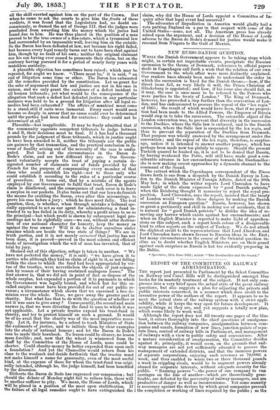NEW RITSSO-DANISH QUESTION.
WHILE the Danish Government appears to be taking steps which might, in certain not improbable events, precipitate the Russian succession to the throne of Denmark, references to official papers made in Copenhagen call forth a wish that the relation of our own Government to the whole affair were more distinctly explained. Our readers have already been made to understand the order in which the succession is fixed for the Danish throne,—how, if the direct issue fail, as very likely it will, the Prince Christian of Gli1cksburg is appointed; and how, if his issue also should fail, as it may, the ease is once more to be referred to the Powers who were parties to the treaty of London.* The King of Denmark, however, has proceeded a step further than the convention of Lon- don, and has endeavoured to procure the repeal of the "lex regia" of 1605; the result of which would have been, that if no proposi- tion had been made to the Allied Powers, the Emperor of Russia would step in to take the succession. The ostensible object of the London convention was, to prevent that diversity in the succession to the Duchies, where the Belie law is enforced, and to the Danish succession, where the Salic law is suspended by the lex regia, and thus to prevent the separation of the Duchies from Denmark. That purpose was wholly answered by the arrangement under the convention ; and the repeal of the lex regia, therefore, is surplus- age, unless it is intended to answer another purpose, which has perhaps been made now too plainly to appear. Should the present Turkish quarrel be hushed up, it is not to be denied that Russia, by having weakened the Porte, will still have made good a con- siderable advance in her encroachments towards the Dardanelles : she is now making covert approaches by a dynastic channel to the command of the Sound.
The extract which the Copenhagen correspondent of the Times draws forth is one from a despatch by the Danish Envoy in Lon- don to the Danish Minister of Foreign Affairs, dated on the 20th May last ; in which the writer reports Lord Clarendon to have made light of the alarm expressed by "good Danish patriots," when the Reichstag thought it necessary to reject the royal pre- position. Lord Clarendon, says the report, insisted that the treaty of London would " remOve those dangers by making the Danish succession an European question." Russia, however, has shown so great a pertinacity and skill in making use of accidents, that it is natural for "good Danish patriots" to dislike the idea of re- moving any barrier which exists against her encroachments; and when an English Minister is reported to make light of apprehen- sions on this subject, such a report lends colour of a disagreeable kind to other reports on the subject of Turkey. We do not attach the slightest credit to the representations that Lord Aberdeen and Lord Clarendon have shown favour to Russian ideas in the East; but many circumstances in the course of the Oriental question in- cline us to doubt whether English Ministers are on their guard against such surprises as Russia is but too evidently preparing in the Baltic.
• Spectator, 11th June 1553; article "The Dardanelles and the Sound."


























 Previous page
Previous page